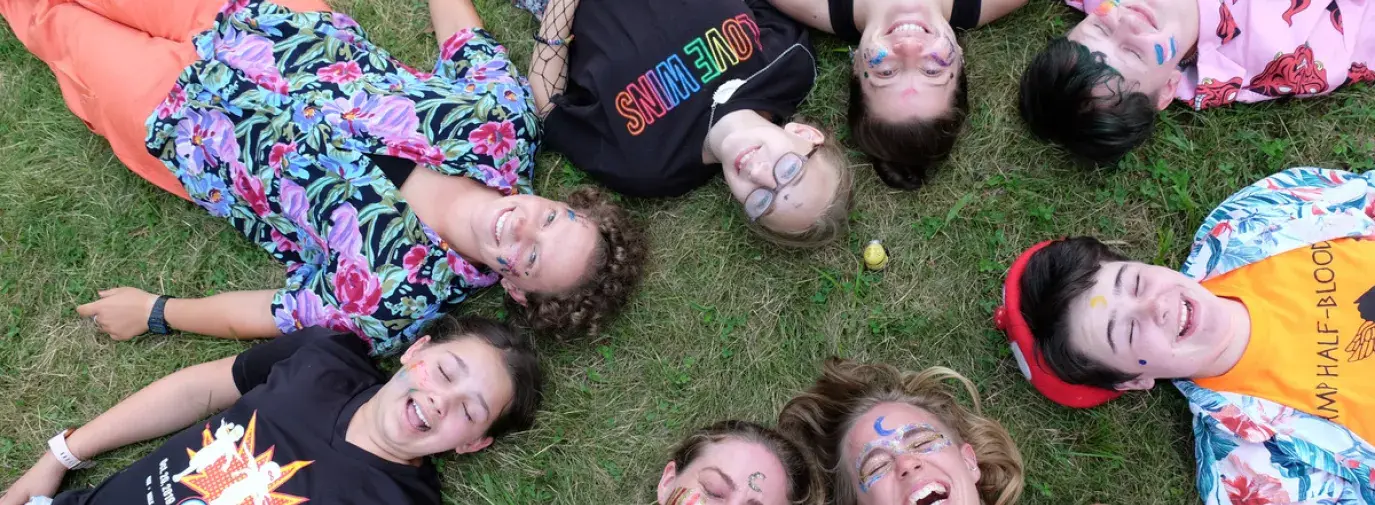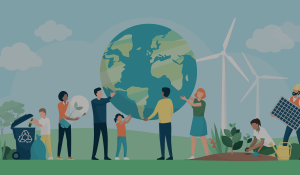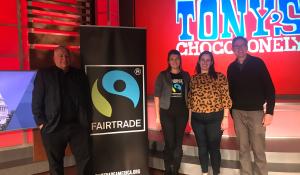
A forest is a family. Surveying the soil, you’ll uncover an impressive network of roots. These subterranean connectors kiss at the tips, passing nutrients and strengthening the whole forest in the process.
Humans are not dissimilar. Communities grow lush through distributed care. And when relationships get disrupted at the roots, people branch out—forging new, fortifying bonds.
A “found family” is an affirming group, consisting of individuals who aren’t genetically related but whose ideals, identities, and/or interests overlap. Activists, elders, and queer people are among many who may find homes in such shared spaces.
We spoke with three organizations to learn how found families cultivate solidarity.
TreePeople: Soothing Nature’s Scars
TreePeople harnesses the collective power of volunteers and staff “to grow a greener, shadier and more water-secure” Southern California. Over four decades, TreePeople has mobilized more than 3 million people to plant and nurture trees, and advance environmental advocacy.
Finding your place and the people you call family can be challenging, says Alyssa Walker, mountain forestry manager at TreePeople, explains—even in a huge city like Los Angeles. But once volunteers gather on common ground, relationships take root. She’s seen people swap phone numbers, inquire about loved ones, and even initiate eco-focused group chats. Each bond sprouts from a “shared concern” about the Earth’s wellbeing.
“It's not often that you find a group with such specific interests working toward a common goal; a group that's as enthusiastic as I am that a Mule Fat [shrub] we planted sprouted tiny leaves or an Arizona Bark Scorpion just crawled on my shovel,” volunteer Danette Rivera, shares. “Of course we become cherished friends because anyone excited about those things belongs together.”
Folding school-aged youth, especially from underserved communities, into TreePeople programming is a priority. In addition to planning events across the city to boost accessibility, the organization coordinates buses for volunteers from East LA.
“Overall, we try to foster an environment of acceptance and welcoming,” Walker says. She stresses the importance of safe spaces, respectful language, and practicing “mindfulness of everything around [them]”—including nonhuman beings. Mother Nature is, of course, a key member of the family.
TreePeople offers room for all SoCal residents to learn about and practice environmental renewal. They will “keep that door open to whomever wants to” contribute.
Elders Climate Action: An Intergenerational Embrace
Elders Climate Action (ECA) stretches the common definition of found family, especially as time and space are concerned.
Made up of thousands of involved elders spanning the nation, their community assumes a loose, broad shape. Members vary by chapter, background, and involvement, but they're unified by technology and a core emotion: love.
ECA member Todd Weber speaks to the elders’ “shared, deep concern” that they helped build “a world that is not in [younger or future people’s] best interests.” Some members are long-time activists, while others are newer advocates. Still, they’re all eager to offset their impact—to sway climate policy and construct “a just and sustainable future” for all life.
Members aren’t planning out their own lives 50 years on “because it won't matter—not for us,” Weber says. “We don't want to play golf [in retirement].” Instead, they’re focused on kids to come.
Ariana Genna, program and grant coordinator, references ECA’s work to make the movement intergenerational. As a college student, she led a discussion series called, “All Generations in Solidarity.” The organization’s aim, she says, is to “create a community of support and mentorship” that transcends age.
Beyond helping others connect, Genna fosters her own bonds with ECA elders. “I feel as though I have adopted dozens of extra-grandparents,” she says. “It is rare to find this sense of community.”
Weber resists the notion that “age [is] a period at the end of our life sentence.” A person’s impact can ripple beyond their time on Earth.
“We have to get all of the elders that have energy and opportunity to stand up,” he says. All are welcome.
Rebels of the Moon: Strong Communities Start with Self Love
When discovered early on, found families can be formative. At Rebels of the Moon, youth camps exist for the express purpose of fostering “radical self-love through connections to nature, body, and community.”
Key to being a “Rebel” is breaking apart “oppressive conditioning,” by challenging what society tells us to believe and feel. To do this work, Rebels use vulnerability, exposing their roots to accept community nourishment. Anyone can be a Rebel, but founder and director Katrina Alden especially encourages LGBTQ youth, people of all body types and abilities, and those most often not accepted and left behind to attend the camp.
Alden explains how this begins on day one: “We go into the big life events that made us who we are.”
Campers share difficult and joyful parts of life in a judgment-free space, where, as Alden enthuses, they proudly proclaim their pronouns and get to know one another authentically. A key lesson in learning self-love, and ultimately putting more care into the world at large, is accepting that others see and love you for exactly who you are.
“These are kids who…their vulnerability is unmatched,” Alden praises. This bravery from young people using their activist voices and eagerness to do the work, they explain, “becomes a web of inspiration” and “create[s] bonds that last a long time.” Alden says that after camps end, they hear from parents that campers remain in touch.
Alden wants Rebels to have a ripple effect: “Community is like concentric circles: inside is youth and we hold space and provide for them. Then the circles keep growing, and everyone has support behind them and somebody they can reach out to.”
Choose Your Family, Then Take Care of It
Like all the different types of forests on our planet, your family can look as vast and diverse as you want. Is it your nuclear family? The lifelong friends you made in the first year of college? Or perhaps it’s your drag family when you finally became Madame Sue Blime.
Growth abounds in ecosystems that provide safety, education, aid, and love. Like any meaningful relationship, maintaining and supporting your found family requires nurture and time spent together intentionally. Whichever family becomes home, you’ll find the forest becomes more beautiful and supportive when you care for it and its history and quality of life.







